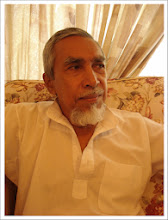1. My father, Mohamad Ismail Merican, was born
into a family of merchants. His grandfather, Mohamad Merican Noordin, was a
very prominent merchant and the founder of the Noordin
family in 19th century
Penang. In his endeavours that spanned five decades or so Mohamad Noordin
amassed great wealth through extensive trading and mercantile activities.
Mohamad Noordin died in 1870 about a decade before my father was born.
2. My grandfather, Vapoo Merican Noordin, was also a merchant in his own right. It was fated that he would never see Mohamad Ismail grew up. After Vapoo died, his two-year old son was brought up by his younger brother, Habib Mohamad Merican Noordin who was a merchant, shipping agent and a public figure.
3. Habib, Mohamed Noordin’s third son, was appointed executor and
trustee of his father’s estate upon his demise. He entered his father’s
business in 1862, spending several years in one of the firms, sailing ships and
trading with Burma. He also assisted his elder brother, Nina Merican Noordin,
with the latter’s company which was established in 1863. Habib died in 1909 at
his residence “Noordin Hall,” Hutton Lane, when Mohamad Ismail was 27.
4. Another one of my father’s uncles, Nina Merican Noordin, was also
a merchant, magistrate, Justice of Peace, juror and Municipal Commissioner. He was
the second son of Mohamed Noordin and inherited his father’s businesses. Later,
Nina formed his own company with its business headquarters at King Street.
5. Nina was appointed as one of the arbitrators to settle the disputes
between secret societies which gave rise to the Penang Riots of 1867. He was
also one of the Commissioners that reported to the government about the Riots inquiry.
He died in May 1880 after a long illness.
6. Lastly, my father’s uncle, Mashoruddin Merican Noordin, was an import-export
trader, land owner, Municipal Commissioner, juror and philanthropist. He was
the youngest son of Mohamed Noordin and inherited the business from his father.
He was successful in expanding his family’s business empire in the latter half of
19th century. He was involved in the import-export trade of locally produced
raw materials with major European trading ports.
7. Mashoruddin’s great wealth was evident in the properties that he
owned. These include several bungalows and warehouses. Some of his properties which
include a prominent mansion named ‘Clifton,’
Marble Hall,
Babington estate and Suffolk
House were sold after his
death.
8. Mashoruddin was a well-known philanthropist. In recognition of his
contributions, he was appointed as a Municipal Commissioner and made a Justice
of Peace. After he died in January 1924, his business empire was inherited by
his family members.
9. When Vapoo passed away in 1884, my father
was still a child to inherit his business. No doubt my father was born into a
family of merchants, but he was not destined to become one. It was evident
since his schooldays that he would be his own man. A writer
wrote that he was “the best English educated of the Noordin’s family.” and that
“he gave early promise of great ability and distinguished himself at studies.”
10. It was reported in the Straits Echo that “Upon leaving school he joined the
tutorial staff of his old School (Penang Free School). He was a popular teacher
and took a great interest in the School.” I quote the following anecdote from
the same paper:
During Mr. Merican’s career at the P.F.S. (Penang Free School), Sir John Anderson, Governor of the Straits Settlements, visited the school. Mr. Hargreaves in introducing him to Sir John, said: “This is a young Malay of means who takes to teaching because he likes it.” Sir John smiled and said, “Very exceptional! very exceptional, indeed!”











No comments:
Post a Comment